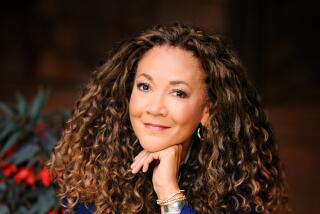Toward, or away from, reconciling
- Share via
A week has passed, and I haven’t heard back from Carolyn.
Last Tuesday, I printed an e-mail I’d received from a reader named Carolyn, criticizing a column of mine from years ago. She’d come away from it believing that I considered most whites insensitive racists and that I felt blacks should always be on the lookout for something to be angry about.
I don’t feel that way; I couldn’t have said that. And because Carolyn didn’t remember “the particulars” of the column, I couldn’t defend myself. So I didn’t answer.
She was mad at me, which made me mad at her. Which was probably why she ignored my public invitation last week to write back. Or maybe she’s no longer reading what I write.
I did, however, hear from almost 100 other readers, sharing their stories of racial slights, strained friendships and awkward moves toward -- or away from -- reconciliation.
--
Many were Carolyn’s defenders. They, too, have felt wary, tongue-tied in the presence of blacks, afraid one wrong phrase innocently uttered -- “the blacks” or “you people” -- would mark them “racist.”
“Carolyn is right on the money,” wrote Richard Eide. “Blacks will always, always, no exceptions, play the race card if they don’t get their way.”
Arcadia resident Jack Muleady, “a 46-year-old white male who grew up in Southern California,” insisted that “colorblind” people like him have been muzzled by Jesse Jackson-types. “Civil rights mouthpieces have literally pounded the white community into submission, due to past sins of other people and generations.”
And a reader named Peter spoke for many when he complained that too many blacks go around with a chip on their shoulder, “inflicting 300 years of history on everyone they come into contact with.”
Not everyone was so negative. Many readers welcomed the chance to share stories of interracial friendships. Others were gratified that they’d been able to forgive others’ transgressions -- a racial slur uttered by a white neighbor; a childhood beating by a black bully.
Still, it was clear the column struck a nerve among readers who are weary of the nation’s recurring cycle of hand-wringing over race, and what they see as my preoccupation with the subject.
“I don’t mean to offend you in any way,” wrote Vicki Tamoush of Tustin, “[but] I too stopped reading your column after I felt that it caused more rigid racial lines to be drawn among us . . . as I began to feel that non-Blacks were always being reminded to put race first, to recognize and tiptoe around a Black person’s Blackness.”
Ouch. Have I really come off like that, turned what I thought was a chance to sit down and chat about a difficult subject into a finger-wagging display of self-righteousness?
Perhaps I should let reader Barbara Nay write my next column. “EVERYONE is tired of talking about race, I’d guess,” she wrote me. “But that doesn’t mean that we must never address issues as they come up. Your African Americaness is as much a part of you as my Jewish Americaness is of me. But ‘part of’ is the operative term.”
--
So when does sensitivity become a chip on the shoulder, wariness mutate into paranoia? Ask Janet Campbell, a white woman married for 29 years to a black man.
She joked in her e-mail that her husband might be “clinically paranoid,” because he seems to see every slight in terms of race. “So-and-so didn’t speak. I guess they don’t like blacks,” he’ll say. “And I explain for the four hundredth time that white people generally don’t ‘speak.’ ”
Her marriage has taught her that race is a “lightning rod;” that she and her husband are bound to see the world through very different eyes.
She recognizes the racial divide in her own family, when her “light-skinned, biracial, attended private schools, raised as middle-class white child in Glendora daughter says to me ‘Mom, you don’t get it. You’re white, we’re not.’ ”
Not white, not black . . . and not bothered by it.
Kids like that are bound to be a thorn in the side of readers like Mike Burns, a white man from Bakersfield. He knows that “racial tribalism is not rational,” but admits “I want grandchildren who LOOK like me!”
Sorry, Mike, but more than 60% of the nation’s teens say they have dated someone of a different race or ethnic group. They’re growing up with shared idols and lingo and musical tastes. They don’t see race as much of a boundary. That’s why my daughter rolls her eyes when I meet a new friend of hers, comment on how pretty she is, then casually ask, “So, what is she?”
My own daughters provide a reality check for me. The black boyfriend has a mom from Sri Lanka. The prom date’s Mexican dad spoke only enough English to say “thank you very much” when he met me. The best friend has a mother from Colombia and father from Poland, yet strangers presume she’s part of our family.
I was thinking about this column on Sunday as I stood in line at a Popeyes in the San Fernando Valley.
In front of me was a gray-haired white man, busy double-checking his order “because they left the gravy out last time.” At a table behind me sat a Latino family -- a heavyset guy with a shaved head and hoop earrings and a pony-tailed mom chastising their rambunctious toddlers in Spanish.
And as I left with my chicken wings, I bumped into a tall Asian guy with a brush cut, tips dyed blond, cradling a wide-eyed baby.
So here we all are, buying fried chicken for dinner. How much talking about race do we really need?
--


